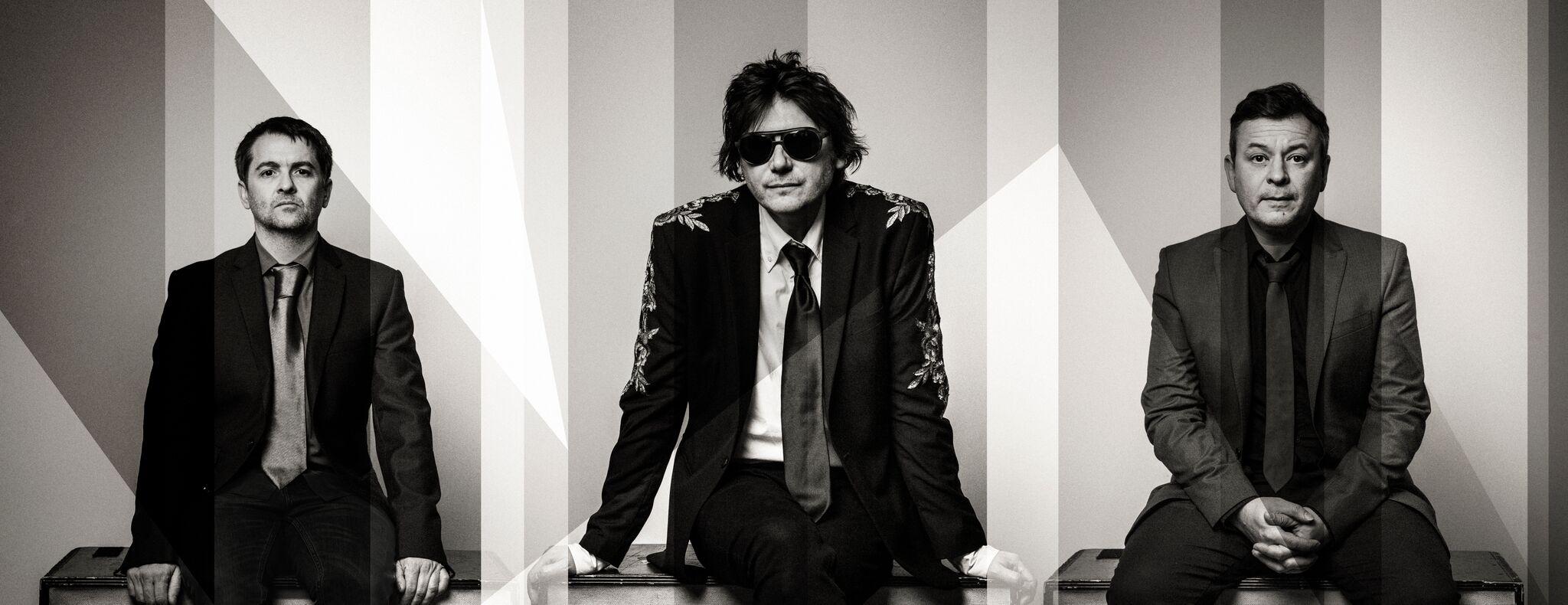Manic Street Preachers: 'Democracy has been overtaken by digital hysteria'
Bassist and lyricist Nicky Wire on fighting the establishment, identity, and why he toned down the more obscure references on new album 'Resistance Is Futile'

At 49, Nicky Wire could still be mistaken for a teenager: with his Bob Dylan shirt, blazer, and wonderful, lazy grin. The only giveaway is the creases that show around his eyes as he takes off his sunglasses.
The Manic Street Preachers bassist and lyricist is finishing up his last few bits of promo in London for their 13th album Resistance is Futile, before heading back home to Wales.
It’s a fantastic album, one of their most concise and versatile records to date, with as much fervour as there was on their debut, but also richly textured stories narrated from a view other than Wire’s – from the tumultuous relationship of Dylan Thomas and Caitlin Macnamara to the story of Vivian Maier, the Chicago nanny who left behind a trove of 150,000 photos that were only discovered after her death.
It’s an album inspired by people, and by the human spirit, but it also homes in on very current feelings of helplessness felt by many in the current political landscape – that outside of London, many have been forgotten amid the Brexit debate.
“It’s a problem in modern day politics,” Wire says, ”if you forget someone, they get angry, and they’ll eventually tell you to f**k off. In the past there was a sense of self-determination through industry, and now … the idea of getting something out of life, of progression [isn’t there]. Obviously with younger people it’s even harder because their identities are either second hand or ridden with debt.
“I feel at the edge of bewilderment, really, because you feel like you’ve seen so many failures, of so many different ideologies. It is hard for us to be any kind of spokesperson.”
He nods at the mention of Ebbw Vale: a former steel town of 18,000 people in the heart of the Welsh valleys, where 62 per cent of the population – the highest proportion in Wales – voted to leave the EU. This despite estimations that it received more EU funding than any other small town in Britain. That’s not enough, though, when you’re angry at the people in power who seem to have forgotten you.
“It’s the ultimate scream, in a way – it’s not eloquent, but it doesn’t have to be,” Wire says. ”It’s their way of saying ‘you’re not listening to me’. Those people as a rule tend to come from a very working class, socialist, Labour background. Undoubtedly money has gone in, but it’s not as sustainable as having a steel plant that once employed 3,000 people on good wages. It was easy for me to vote to stay in the EU because it makes my life much easier, but I totally understand where that rage comes from.
“There’s a lot of finger pointing today – a clash of opinion. I look back and think I was lucky enough to live in a time where there was a genuine argument and debate. That didn’t always give the right decision – we grew up during Thatcher, in some of the most brutal times ever – but I’ve always felt that democracy could work. And at the moment it almost feels like democracy has been overtaken by digital hysteria. Trying to win, as a rule, doesn’t get you anywhere.”
There are many caricatures of the Manics, he notes, whether they’re shaking hands with Fidel Castro or writing a song with Kylie Minogue (”Some Kind of Bliss”). But in all of those strands, there remains at the heart of it a genuine philosophy that you meet people without forming any preconceptions of them. It sounds a bit hippy-ish,” Wire admits with a laugh, along with his ideas of a genuine empathy that he keeps regardless if he doesn’t always agree with someone (”it doesn’t mean they’re a terrible person”).
“Our judgement has always been on a one-to-one basis, but I can’t see how that idea fits into the modern landscape. It’s quite disturbing, really. I wish I had a more coherent policy of what can change things. As a young person you always think you’ve got the answers, and I can honestly say I don’t think I have any at all.”
Rappers are often the ones who deliver today’s “social poetry,” he observes: “Sometimes it can be a bit too nihilistic, but then I always like a bit of nihilism,” he adds with a self-aware grin. ”And I can’t even judge our own music anymore. Me, James and Sean look at each other sometimes and think we’ve done something truly brilliant, and then we think: ‘Who’s gonna be f**king interested?’”
“It feels pointless, sometimes – us as a band, trying to comment – and working out if it’s still relevant. With Stormzy on the BRIT Awards, I thought that was a brilliant moment. On Twitter you had the old men going ‘the Brits are s**t’, but it was a moment. The ferocity! At our age, doing something similar would seem pretty s**t,” he says. ”And that’s where we find ourselves. So I was really happy to sit back and be part of a TV moment.”
That uncertainty is why Resistance is Futile is so melodic, he reveals, wryly suggesting the element of uncertainty and doubt is “quite soothing to people of a certain age”. Jumping up to fetch a bottle of water, he chides himself for referring to age again: “I don’t actually feel that old,” he admits. “It gets quite embarrassing sometimes to feel as young as I do. It’s slightly unpalatable.”

You’d be hard-pushed to find music fans with a fiercer loyalty to their band than the Manics – it’s quite exceptional to watch. And the band will never forget it, or stop being grateful, Wire says, because they come from what many would deem a “pretty unfashionable place”.
“Four kids from the same comprehensive school in the middle of the miner’s strike – so much so that it sounds over-romantic,” he says, beaming when he learns this writer lived in the “ugly, lovely town” for three years at university: ”I lived in Swansea myself for three years and they were three of the best years of my f**king life. So it’s in our DNA, that I never go to a place and think ‘this is a f**king s**thole’, because there’s something to be found – people, stories – everywhere you go.”
He wanted to capture that feeling on new song “Liverpool Revisited”, he says, one day when he got up early to wander around the city taking polaroids: “As a songwriter – which I don’t really like to call myself, sometimes – that is just a purely magical day. Realising the resilience and the defiance of those people… no one else would have helped them!”
“I think of the 96, as the tears fall down on me,” frontman James Dean Bradfield sings, and a little later: “Fight for justice, fight for life/there are angels in these skies.” The song honours not just the victims of the Hillsborough disaster, but their families, who fought the establishment and seemed determined to come back stronger each time. Few places have a stoicism and pride quite like the Welsh, an album review in The Independent noted but Liverpool could give them a run for their money.
“To have the whole of the British establishment against you – it was such an amazing achievement,” Wire says. “Then all the culture that fed into me, hearing the Bunnymen, and The La’s in my head, the Beatles of course, and Roger McGough’s poetry.
“The greatest luxury of being in a band is that every place you go, it leaves a little imprint, for better or worse. I’ve always picked up little bits of inspiration. Our approach of not judging people does come from living in the middle of nowhere.”
“Dylan and Caitlin” was one of the few songs Wire “designed” as a duet, he says, and it was written with Welsh singer The Anchoress in mind (”she is too talented, it makes me so f**king jealous”) – he generally avoids writing out of character as a rule because “it’s not my strongest suit”.
But on songs like “Dylan and Caitlin”, and on their 2007 hit single “Your Love Alone”, it works. “It felt like a big relief,” Wire says, “especially after Rewind the Film which was pretty confessional. To write about Vivian [Maier] as well, about all these inspirational characters. It felt good to stop bombarding people with my confessional misery,” he says with another laugh.
“There are some weird preconceptions of us, because our politics have always been socialist, but there’s been a massive amount of existentialism, and, dare I say it, fun, involved in that. Because The Situationists are as big an influence on us as Nye Bevan. That was where the colour came from, because otherwise we would have been a pretty drab band.”

Wire consumed less culture in 2017 than he had before: apart from Philip Larkin‘s poetry he virtually stopped reading. It was something of a conscious decision after the release of their previous album, 2014’s Futorology, which he loves, but was “overwrought” with references from Mayakovsky to Malevich, and he worried Bradfield, who has to sing the lyrics, “didn’t know what I was f**king on about”.
“This year I’ve been massively turned around with St Vincent,” he says of the new music he’s come to after the record was finished, adding with a small bellow: ”It’s just so powerful. If there’s one high concept artist totally in control of every aspect, then it’s her. When she picks up the guitar” – he mimes playing – ”it’s so violent, but in a controlled way. And I’m addicted to Sunflower Bean, I love that record [Twentytwo In Blue] so much. And the lyrics are brilliant.
“We were lucky,” he adds, of new bands breaking through. ”For us, being in a band you got £30,000 to go on tour. It was a massive mistake around Napster time when everyone thought record companies were the enemy. They weren’t, they were full of philanthropists and people who loved music... it was the tech guys who hated music. Making it as a band doesn’t seem like a reality anymore. With us it was proper, old school hard work, and that’s what got you there. Now that doesn’t matter so much.”
With many of those bands, he suggests, they’re just waiting for the one song “to really make it” – the one which defines them.
“You just have to hang your hat on a song at some point and it takes you somewhere else. When Oasis released “Live Forever”, I remember me and James were crushed, because it topped everything we’d ever done. Then we went back and tried something else.”
Two years ago at the Royal Albert Hall, the Manics celebrated the release of their first big commercial success, Everything Must Go. It went down as one of those shows that lingers at the back of the audience’s mind long after they’ve left the venue – one they won’t forget.
“Even I was surprised by those shows,” Wire smiles. ”It was actually emotional being on stage. Me and James looked at each other after and were like, ‘what the f**k happened there?!’ And because of the venue, it was like people were banked at the side: it was really old fashioned, there were no barriers. It was f**king spectacular. We’ve done every venue so many times, and when the night seems to spark off of something… it’s pretty amazing.”
‘Resistance Is Futile’ is out now on Columbia Records
Join our commenting forum
Join thought-provoking conversations, follow other Independent readers and see their replies
Comments
Bookmark popover
Removed from bookmarks